衡水中学高2017届16-17学年(下)第三次调研——英语
衡水中学2016-2017学年高一下学期期中考试英语试题解析(原卷版)
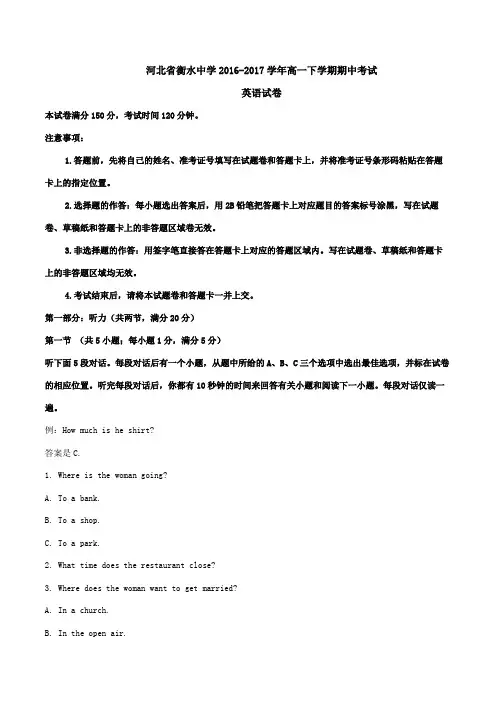
河北省衡水中学2016-2017学年高一下学期期中考试英语试卷本试卷满分150分,考试时间120分钟。
注意事项:1.答题前,先将自己的姓名、准考证号填写在试题卷和答题卡上,并将准考证号条形码粘贴在答题卡上的指定位置。
2.选择题的作答:每小题选出答案后,用2B铅笔把答题卡上对应题目的答案标号涂黑,写在试题卷、草稿纸和答题卡上的非答题区域卷无效。
3.非选择题的作答:用签字笔直接答在答题卡上对应的答题区域内。
写在试题卷、草稿纸和答题卡上的非答题区域均无效。
4.考试结束后,请将本试题卷和答题卡一并上交。
第一部分:听力(共两节,满分20分)第一节(共5小题;每小题1分,满分5分)听下面5段对话。
每段对话后有一个小题,从题中所给的A、B、C三个选项中选出最佳选项,并标在试卷的相应位置。
听完每段对话后,你都有10秒钟的时间来回答有关小题和阅读下一小题。
每段对话仅读一遍。
例:How much is he shirt?答案是C.1. Where is the woman going?A. To a bank.B. To a shop.C. To a park.2. What time does the restaurant close?3. Where does the woman want to get married?A. In a church.B. In the open air.C. In a country house.4. What does the woman think of the decision to build a new hospital?A. It is a waste of time.B. It is a waste of money.C. It should have been built earlier.5. What is the woman doing?A. Asking for permission.B. Making a complaint.C. Ordering a dish.听下面5段对话或独白。
衡水中学高2017届16-17学年(下)一模试题——英语
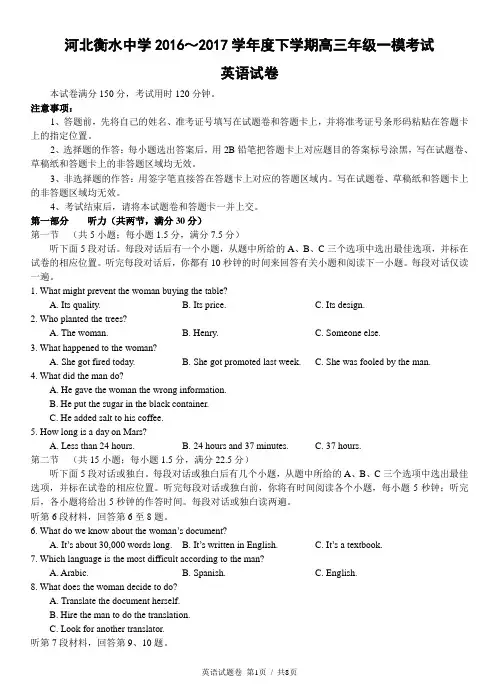
河北衡水中学2016~2017学年度下学期高三年级一模考试英语试卷本试卷满分150分,考试用时120分钟。
注意事项:1、答题前,先将自己的姓名、准考证号填写在试题卷和答题卡上,并将准考证号条形码粘贴在答题卡上的指定位置。
2、选择题的作答:每小题选出答案后,用2B铅笔把答题卡上对应题目的答案标号涂黑,写在试题卷、草稿纸和答题卡上的非答题区域均无效。
3、非选择题的作答:用签字笔直接答在答题卡上对应的答题区域内。
写在试题卷、草稿纸和答题卡上的非答题区域均无效。
4、考试结束后,请将本试题卷和答题卡一并上交。
第一部分听力(共两节,满分30分)第一节(共5小题;每小题1.5分,满分7.5分)听下面5段对话。
每段对话后有一个小题,从题中所给的A、B、C三个选项中选出最佳选项,并标在试卷的相应位置。
听完每段对话后,你都有10秒钟的时间来回答有关小题和阅读下一小题。
每段对话仅读一遍。
1. What might prevent the woman buying the table?A. Its quality.B. Its price.C. Its design.2. Who planted the trees?A. The woman.B. Henry.C. Someone else.3. What happened to the woman?A. She got fired today.B. She got promoted last week.C. She was fooled by the man.4. What did the man do?A. He gave the woman the wrong information.B. He put the sugar in the black container.C. He added salt to his coffee.5. How long is a day on Mars?A. Less than 24 hours.B. 24 hours and 37 minutes.C. 37 hours.第二节(共15小题;每小题1.5分,满分22.5分)听下面5段对话或独白。
衡水中学2016-2017学年高一下学期期中考试英语试题解析(解析版)
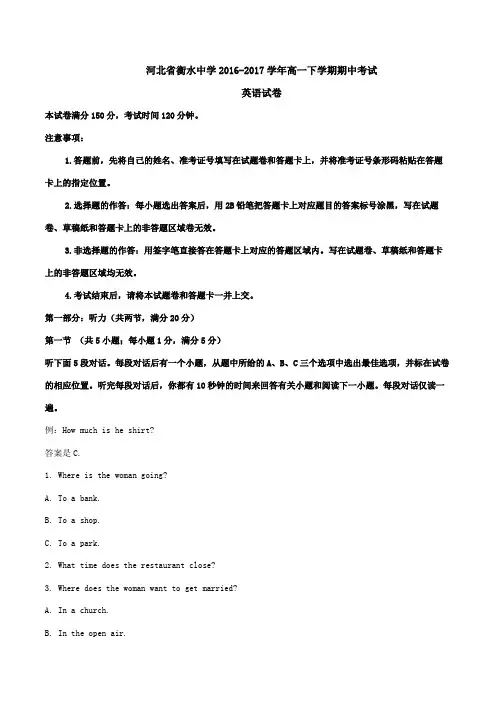
河北省衡水中学2016-2017学年高一下学期期中考试英语试卷本试卷满分150分,考试时间120分钟。
注意事项:1.答题前,先将自己的姓名、准考证号填写在试题卷和答题卡上,并将准考证号条形码粘贴在答题卡上的指定位置。
2.选择题的作答:每小题选出答案后,用2B铅笔把答题卡上对应题目的答案标号涂黑,写在试题卷、草稿纸和答题卡上的非答题区域卷无效。
3.非选择题的作答:用签字笔直接答在答题卡上对应的答题区域内。
写在试题卷、草稿纸和答题卡上的非答题区域均无效。
4.考试结束后,请将本试题卷和答题卡一并上交。
第一部分:听力(共两节,满分20分)第一节(共5小题;每小题1分,满分5分)听下面5段对话。
每段对话后有一个小题,从题中所给的A、B、C三个选项中选出最佳选项,并标在试卷的相应位置。
听完每段对话后,你都有10秒钟的时间来回答有关小题和阅读下一小题。
每段对话仅读一遍。
例:How much is he shirt?答案是C.1. Where is the woman going?A. To a bank.B. To a shop.C. To a park.2. What time does the restaurant close?3. Where does the woman want to get married?A. In a church.B. In the open air.C. In a country house.4. What does the woman think of the decision to build a new hospital?A. It is a waste of time.B. It is a waste of money.C. It should have been built earlier.5. What is the woman doing?A. Asking for permission.B. Making a complaint.C. Ordering a dish.听下面5段对话或独白。
衡水中学高2017届16-17学年(下)七调试题——英语
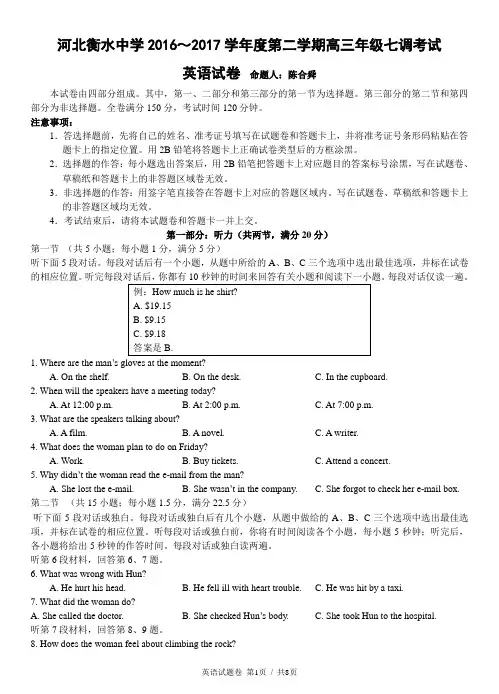
河北衡水中学2016~2017学年度第二学期高三年级七调考试英语试卷命题人:陈合舜本试卷由四部分组成。
其中,第一、二部分和第三部分的第一节为选择题。
第三部分的第二节和第四部分为非选择题。
全卷满分150分,考试时间120分钟。
注意事项:1.答选择题前,先将自己的姓名、准考证号填写在试题卷和答题卡上,并将准考证号条形码粘贴在答题卡上的指定位置。
用2B铅笔将答题卡上正确试卷类型后的方框涂黑。
2.选择题的作答:每小题选出答案后,用2B铅笔把答题卡上对应题目的答案标号涂黑,写在试题卷、草稿纸和答题卡上的非答题区域卷无效。
3.非选择题的作答:用签字笔直接答在答题卡上对应的答题区域内。
写在试题卷、草稿纸和答题卡上的非答题区域均无效。
4.考试结束后,请将本试题卷和答题卡一并上交。
第一部分:听力(共两节,满分20分)第一节(共5小题;每小题1分,满分5分)听下面5段对话。
每段对话后有一个小题,从题中所给的A、B、C三个选项中选出最佳选项,并标在试卷的相应位置。
每段对话仅读一遍。
1. Where are the man’A. On the shelf.B. On the desk.C. In the cupboard.2. When will the speakers have a meeting today?A. At 12:00 p.m.B. At 2:00 p.m.C. At 7:00 p.m.3. What are the speakers talking about?A. A film.B. A novel.C. A writer.4. What does the woman plan to do on Friday?A. Work.B. Buy tickets.C. Attend a concert.5. Why didn’t the woman read the e-mail from the man?A. She lost the e-mail.B. She wasn’t in the company.C. She forgot to check her e-mail box.第二节(共15小题;每小题1.5分,满分22.5分)听下面5段对话或独白。
2020年2020届河北省衡水中学2017级高三下学期三模考试英语试卷参考答案
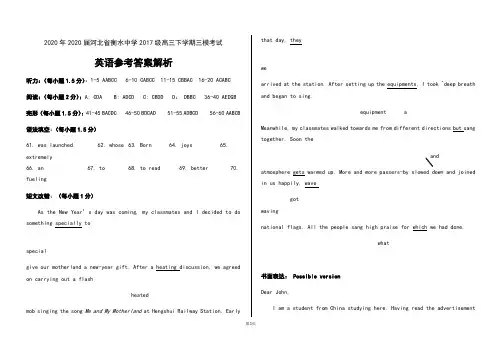
2020年2020届河北省衡水中学2017级高三下学期三模考试英语参考答案解析听力:(每小题1.5分):1-5 AABCC 6-10 CABCC 11-15 CBBAC 16-20 ACABC阅读:(每小题2分):A: CDA B: ADCD C: CBDD D: DBBC 36-40 AEDGB完形(每小题1.5分):41-45 BACDC 46-50 BDCAD 51-55 ADBCD 56-60 AABCB 语法填空:(每小题1.5分)61. was launched 62. whose 63. Born 64. joys 65. extremely66. an 67. to 68. to read 69. better 70. fueling短文改错:(每小题1分)As the New Year’s day was coming, my classmates and I decided to do something specially tospecialgive our motherland a new-year gift. After a heating discussion, we agreed on carrying out a flashheatedmob singing the song Me and My Motherland at Hengshui Railway Station. Earlythat day, theywearrived at the station. After setting up the equipments, I took ^deep breath and began to sing.equipment aMeanwhile, my classmates walked towards me from different directions but sang together. Soon theand atmosphere gets warmed up. More and more passers-by slowed down and joined in us happily, wavegot wavingnational flags. All the people sang high praise for which we had done.what书面表达:Possible versionDear John,I am a student from China studying here. Having read the advertisement第1页。
衡水中学高2017届16-17学年(下)第二次摸底——英语
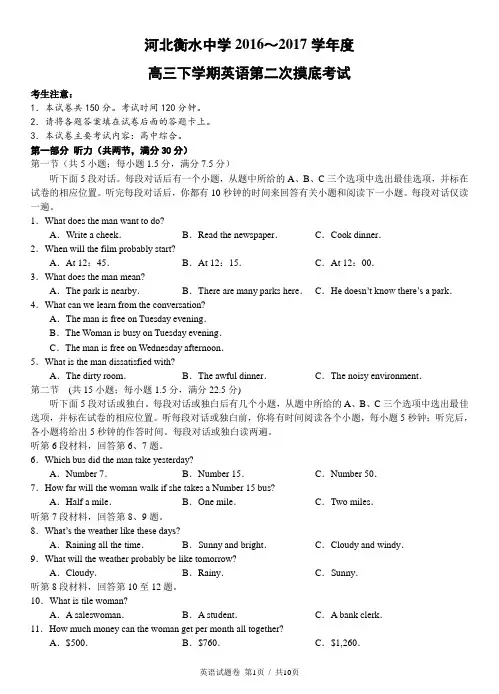
河北衡水中学2016~2017学年度高三下学期英语第二次摸底考试考生注意:1.本试卷共150分。
考试时间120分钟。
2.请将各题答案填在试卷后面的答题卡上。
3.本试卷主要考试内容:高中综合。
第一部分听力(共两节,满分30分)第一节(共5小题;每小题1.5分,满分7.5分)听下面5段对话。
每段对话后有一个小题,从题中所给的A、B、C三个选项中选出最佳选项,并标在试卷的相应位置。
听完每段对话后,你都有10秒钟的时间来回答有关小题和阅读下一小题。
每段对话仅读一遍。
1.What does the man want to do?A.Write a cheek.B.Read the newspaper.C.Cook dinner.2.When will the film probably start?A.At 12:45.B.At 12:15.C.At 12:00.3.What does the man mean?A.The park is nearby.B.There are many parks here.C.He doesn’t know there’s a park.4.What can we learn from the conversation?A.The man is free on Tuesday evening.B.The Woman is busy on Tuesday evening.C.The man is free on Wednesday afternoon.5.What is the man dissatisfied with?A.The dirty room.B.The awful dinner.C.The noisy environment.第二节(共15小题;每小题1.5分,满分22.5分)听下面5段对话或独白。
每段对话或独白后有几个小题,从题中所给的A、B、C三个选项中选出最佳选项,并标在试卷的相应位置。
2017届河北省衡水中学高三下学期第三次摸底考试英语试卷及答案
2017届衡水中学高三下学期三摸考试英语试卷第Ⅰ卷第一部分听力(共两节,满分30分)第一节(共5小题;每小题1.5分,满分7.5分)听下面5段对话。
每段对话后有一个小题,从题中所给的A、B、C三个选项中选出最佳选项,并标在试卷的相应位置。
听完每段对话后,你都有10秒钟的时间来回答有关小题和阅读下一小题。
每段对话仅读一遍。
1.What time is it now?A.6:40.B.7:15.C.7:45.2.What does the man think about the woman's hat?A.It's very good.B.He likes the style of it.C.It doesn't go well with her dress.3.How did the man hear about the accident?A.From Mary.B.In the newspaper.C.On the television.4.What does the man mean?A.The woman should go away.B.He will go closer to the woman.C.He can hear the woman very well.5.What can we know from the conversation?A.The woman doesn't like orange juice.B.The man was looking for orange juice.C.The man broke the container of the orange juice.第二节(共15小题;每小题1.5分,满分22.5分)听下面5段对话或对白,每段对话或独白后有几个小题,从题中所给的A、B、C三个选项中选出最佳选项,并标在试卷的相应位置,听每段对话或独白前,你将有时间阅读各个小题。
河北省衡水中学2017届高三下学期七调英语试题
本试卷由四部分组成。
其中,第一、二部分和第三部分的第一节为选择题。
第三部分的第二节和第四部分为非选择题。
全卷满分150分,考试时间120分钟。
注意事项:1.答选择题前,先将自己的姓名、准考证号填写在试题卷和答题卡上,并将准考证号条形码粘贴在答题卡上的指定位置。
用2B铅笔将答题卡上正确试卷类型后的方框涂黑。
2.选择题的作答:每小题选出答案后,用2B铅笔把答题卡上对应题目的答案标号涂黑,写在试题卷、草稿纸和答题卡上的非答题区域卷无效。
3.非选择题的作答:用签字笔直接答在答题卡上对应的答题区域内。
写在试题卷、草稿纸和答题卡上的非答题区域均无效。
4.考试结束后,请将本试题卷和答题卡一并上交。
第一部分:听力(共两节,满分20分)第一节(共5小题;每小题1分,满分5分)听下面5段对话。
每段对话后有一个小题,从题中所给的A、B、C三个选项中选出最佳选项,并标在试卷的相应位置。
听完每段对话后,你都有10秒钟的时间来回答有关小题和阅读下一小题。
每段对话仅读一遍。
例:How much is he shirt?A. $19.15B. $9.15C. $9.181. Where are the man’s gloves at the moment?A. On the shelf.B. On the desk.C. In the cupboard.2. When will the speakers have a meeting today?A. At 12:00 p.m.B. At 2:00 p.m.C. At 7:00 p.m.3. What are the speakers talking about?A. A film.B. A novel.C. A writer.4. What does the woman plan to do on Friday?A. Work.B. Buy tickets.C. Attend a concert.5. Why didn’t the woman read the e-mail from the man?A. She lost the e-mail.B. She wasn’t in the company.C. She forgot to check her e-mail box.第二节(共15小题;每小题1.5分,满分22.5分)听下面5段对话或独白。
衡水中学高2017届16-17学年(下)六调试题——英语
河北衡水中学2016~2017学年度下学期高三年级六调考试英语试题第I卷第一部分:听力(共两节,满分30分)第一节(共5小题;每小题1.5分,满分7.5分)听下面5段对话。
每段对话后有一个小题,从题中所给的A、B、C三个选项中选出最佳选项,并标在试卷的相应位置。
听完每段对话后,你都有10秒钟的时间来回答有关小题和阅读下一小题。
每段对话仅读一遍。
1. What will the man do on Saturday evening?A. Go cycling.B. Do the cooking.C. Attend a party,2. Where are the speakers?A. In a laundry.B. In a tailor‟s.C. In a clothes stop.3. How dues the man go to work every day?A. On foot.B. By bus.C. By car4. What does the man think of his present job?A. Well-paid.B. Boring.C. Challenging.5. What are the speakers mainly talking about?A. A dress.B. A play.C. A photo.第二节(共15小题;每小题1.5分,满分22.5分)听下面5段对话或独白。
每段对话或独白后有几个小题,从题中做给的A、B、C三个选项中选出最佳选项,并标在试卷的相应位置。
听每段对话或独白前,你将有时间阅读各个小题,每小题5秒钟;听完后,各小题将给出5秒钟的作答时间。
每段对话或独白读两遍。
听第6段材料,回答第6、7题。
6. Why is the man at the airport?A. To meet the woman.B. To pick up some passengers.C. To board a plane7. Which flight has been delayed?A. The Italian flight.B. The Spanish flightC. The French flight听第7段材料,回答第8、9题。
2020届河北省衡水中学2017级高三三调考试英语试卷及答案
绝密★启用前2020届河北省衡水中学2017级高三三调考试英语试卷★祝考试顺利★(考试时间:120分钟试卷满分:150分)注意事项:1. 答卷前,考生务必将自己的姓名、准考证号填写在答题卡上。
2. 回答选择题时,选出每小题答案后,用铅笔把答题卡上对应题目的答案标号涂黑。
如需改动,用橡皮擦干净后,再选涂其他答案标号。
回答非选择题时,将答案写在答题卡上,写在本试卷上无效。
3. 考试结束后,将本试卷和答题卡一并交回。
第一部分听力(共两节,满分30分)做题时,先将答案标在试卷上。
录音内容结束后,你将有两分钟的时间将试卷上的答案转涂到答题卡上。
第一节(共5小题;每小题1.5分,满分7.5分)听下面5段对话。
每段对话后有一个小题,从题中所给的A、B、C三个选项中选出最佳选项。
听完每段对话后,你都有10秒钟的时间来回答有关小题和阅读下一小题。
每段对话仅读一遍。
例:How much is the shirt?A. £ 19. 15.B. £ 9. 18.C. £ 9. 15.答案是 C。
1.What will James do tomorrow ?A.Watch a TV program.B.Give a talk.C.Write a report. 2.What can we say about the woman?A.She's generous.B.She's curious.C.She's helpful.3.When does the train leave?A.At 6:30.B.At 8:30.C.At 10:30.4.How does the woman go to work?A.By car.B.On foot.C.By bike.5.What is the probable relationship between the speakers?A.Classmates.B.Teacher and student.C.Doctor and patient.第二节(共15小题;每小题1.5分,满分22.5分)听下面5段对话或独白。
- 1、下载文档前请自行甄别文档内容的完整性,平台不提供额外的编辑、内容补充、找答案等附加服务。
- 2、"仅部分预览"的文档,不可在线预览部分如存在完整性等问题,可反馈申请退款(可完整预览的文档不适用该条件!)。
- 3、如文档侵犯您的权益,请联系客服反馈,我们会尽快为您处理(人工客服工作时间:9:00-18:30)。
河北省衡水中学2016~2017学年度高三下学期英语第三次调研考生注意:1.本试卷共四部分,共150分。
考试时间120分钟。
2.请将各题答案填在试卷后面的答题卡上。
3.本试卷主要考试内容:高考全部内容第一部分:听力(共两节,满分30分)第一节(共5小题;每小题1.5分,满分7.5分)听下面5段对话。
每段对话后有一个小题,从题中所给的A、B、C三个选项中选出最佳选项,并标在试卷的相应位置。
听完每段对话后,你都有10秒钟的时间来回答有关小题和阅读下一小题。
每段对话仅读一遍。
1. What can we know about the woman?A. She has traveled by subway before.B. She thinks it’s fast to take a subway.C. She thinks the subway is the cheapest.2. What’s the man doing?A. Seeking help.B. Giving advice.C. Offering help.3. What does the woman mean?A. She didn’t like the comedy.B. She didn’t watch the comedy.C. She thought the comedy was funny.4. When did the man enter Harvard University?A. Three years ago.B. Last year.C. This year.5. Where does this conversation most probably take place?A. At an airport.B. On the beach.C. At a travel agency.第二节(共15小题;每小题1.5分,满分22.5分)听下面5段对话或独白。
每段对话或独白后有几个小题,从题中做给的A、B、C三个选项中选出最佳选项,并标在试卷的相应位置。
听每段对话或独白前,你将有时间阅读各个小题,每小题5秒钟;听完后,各小题将给出5秒钟的作答时间。
每段对话或独白读两遍。
听第6段材料,回答第6、7题。
6. What does the woman say about the party?A. The food is good.B. It’s very exciting.C. There’s much to do.7. What does the man think matters most?A.Dancing to the music.B. Looking smart.C. Enjoying himself.听第7段材料,回答第8、9题。
8. What is the online article about?A. Cell phone control.B. Cell phone thefts.C. Cell phone accidents.9. Where will the man put his cell phone when he goes to bed?A.In his bed.B. On his table.C. Outside his bedroom.听第8段材料,回答第10至12题。
10. What’s wrong with the man’s camera?A. Its screen always goes black.B. Its battery runs out very quickly.C. Its button doesn’t work properly.11. How long has the man had the camera?A. A week.B. Half a month.C. A month.12. What is the woman’s attitude?A. Impatient.B. Sincere.C. Rude.听第9段材料,回答第13至16题。
13.What does the man intend to do in the beginning?A. Go to see the doctor.B. Talk to the director.C. Ask for a sick leave.14. Why hasn’t the man gone to sleep?A. He is having trouble falling asleep.B. He is waiting for a call from his doctorC. He doesn’t need to get up early the next morning.15. What is the man’s work environment like?A. Tense.B. Noisy.C. Joyful.16. What will the woman get next month?A. A vacationB. A higher salary.C. A new job.听第10段材料,回答第17至20题。
17. What did the man do immediately after he woke up?A. He looked out of the window.B. He turned on the TV.C. He prepared to leave.18. What was the weather like that day?A. Windy.B. Sunny.C. Rainy.19. When did the speaker know he was safe?A. When he got into his car.B. When he came outside in the garden.C. When he drove across a long bridge.20. What can we know about the speaker from the speech?A. He left without taking anything.B. He left his animals running away from home.C. He couldn’t see the road clearly because of smoke.第二部分阅读理解(共两节,满分40分)第一节(共15小题;每小题2分,满分30分)阅读下列短文,从每题所给的四个选项A、B、C和D四个选项中,选出最佳选项。
AThe Great War ExhibitionWhen: Sun 10 Jan, 9:00 am- 6:00 pmMon 11 Jan, 9:00 am- 6:00 pmWhere: Dominion Museum Building, 15 Buckle Street, WellingtonRestrictions: All AgesTicket Information: Admission FreeThe journey i rich in personal stories which tell of the great experience of the battlefields and the hardships at home during wear-time New Zealand. The visitors will experience the desperate horrors and the victories of the human spirit that were part of the Great War.Kaipara Coast Plants & Sculpture GardensWhen: Sun 10 Jan, 9:00 am- 5:00 pmMon 11 Jan, 9:00 am- 5:00 pmWhere : 1481 Kaipara Coast Highway (SH16), AucklandRestrictions: All AgesTicket Information:●Adults:$10.00●Children 5-13 (under 5 and free):$ 5.00●Groups 10 : $ 8.00●Over 60 &. Students (with ID): $ 9.00Come and enjoy a relaxed art and garden experience. Sculptures are for sale and the display changes completely ever 12 moths with the new exhibition opening in December each year to give you a fresh experienceeach time you come.Dream Works AnimationWhen: Sun 10 Jan, 10:00 am- 6:00 pmMon 11 Jan, 10:00 am- 6:00 pmWhere: Te Papa, 55 Cable St, WellingtonRestrictions: All AgesTicket Information:●Adults: $ 15.00●Children &Students 3-15 (with Student ID): $ 6.00●Children under 3: $0.00The exhibition features over 400 items, including rare concept drawing, models, interviews, and original artworks. Adults and kids can get creative with real animation tools, and soar above the clouds in the Dragon Flight experience from How to Train Your Dragon.Balls, Bullets and BootsWhen: Sun 10 Jan, 9:00 am- 4:30 pmMon 11Jan, 9:00 am- 4:30 pmWhere: National Army Museum, 1 Hassett Dr, SH1, WaiouruRestrictions: All AgesTicket Information: Door Sales OnlyThe exhibition explores the impact the cruel reality of war had on colonial sportsmen and their loved ones as they were transplanted from the rugby fields of home to fight.21. If a couple with their son aged 5 attend the second and the third exhibitions, know much should they pay?A. $ 53.B. $61.C. $75.D. $82.22. Which of the following may attract a sport-lover most?A. Balls, Bullets and Boots.B. The Great War Exhibition.C. Dream Works Animation.D. Kaipara Coast Plants &Sculpture Gardens.23. The main purpose of the text is to .A. Persuade people to study history seriouslyB. Attract more visitors to join in the exhibitionsC. Advise people to spend more time with familiesD. Compare the differences of four different exhibitionsBWe can have conflicts with our important persons like friends, relatives, workmates, etc. But the conflicts doesn’t necessarily mean that the relationship will be destroyed. In fact, sometimes conflict helps people to let out their silent feelings, allowing them to free their suppressed emotions. However, when in a conflict, we usually get angry and say or do things which aren’t linked to the problem at hand. Therefore, it is important that we should try to avoid conflicts through effective communication.In a heated argument, we usually say things that aren’t related to the real problem, and even use rude words to make sure we gain an advantage over the other person. Then the whole situation goes badly. So we should separate(隔离) the root cause of the problem and build our discussion around it. This ensures that there are no rude remarks and the situation moves in a positive direction.It’s easy for us to think we’re right and if something isn’t working out, it surely must be someone else’s fault. However, if you aim to solve a conflict, first of all, you should show some respect and allow the other party to express themselves. Using remarks like, “I understand your concern on this” or “I know you’re right at your end”,would make the other person feel more appreciated.Sometimes some people get too excited and may behave in the wrong way or say something others may not appreciate. This can cause a worse situation. Actually, they should control their emotions and keep calm. This has to be learned through self-control and observing behavior of other people.The tips mentioned above are useful for most situations. However, we don’t rule out the possibility that there are some people always want to create some sort of trouble for others. You can tell them from others, and putting in an effort to resolve a conflict with them may just not be a wise idea. The best way to deal with these people is to forget them. A famous saying can help you and that is: “You should never fight with a pig; you both get dirty and only the pig likes it.”24. What can we learn from Paragraph 1?A. Conflicts may help us deal with our emotions.B. Conflicts can improve our relations with others greatly.C. Effective communication can help us avoid conflicts undoubtedly.D. The closer two friends are, the more conflicts are between them.25. When making discussions to solve conflicts, we should .A. know others’ personal qualityB. know others’ ability of expressionC. avoid showing our disadvantagesD. avoid the root cause of the problem26. The author suggests that when people get too excited, they should .A. behave like other peopleB. control the situationC. learn to keep their headD. say something unconcerned27. In the author’s opinion, how should you deal with those who always want to create trouble for you?A. Fight with them.B. Ignore them.C. Have a talk with them.D. Give them something they like.CAnxiety has now surpassed depression as the most common mental health disease among college students, though depression, too, is on the rise. More than half of students visiting campus clinics cite anxiety as a health concern, according to a recent study of more than 100,000 students nationwide by the Center for Collegiate Mental Health at Penn State. Nearly one in six college students has been diagnosed with or treated for anxiety within the last 12 months, according to the annual national survey by the American College Health Association.The causes range widely, experts say, from mounting academic pressure at earlier ages to overprotective parents to engagement with social media. Anxiety has always played a role in the development of a student’s life, but now more students experience anxiety so acute that they are seeking professional help. Like many college clinics, the Center for Counseling and Psychological Services at the University of Central Florida (UCF)—one of the country’s largest and fastest-growing universities, has seen sharp increases in the number of clients: 15.2 percent over last year alone.Anxiety has become characteristic of the current generation of college students, said Dan Jones, the director of Counseling and Psychological Services at Appalachian State University in Boone, N. C. Because of increasingly pressures during high school, he and other experts say, students arrive at college preloaded with stress. Accustomed to extreme parental oversight, many seem unable to govern themselves. And with parents so accessible, students have had less incentive to develop life skills. “They can’t tolerate discomfort or having to struggle,” Dr Jones said.More often, anxiety is mild and temporary, the indication of a student under the control of a normal developmental issue-learning time management, for example, or how to handle rejection from a sorority. Mild anxiety is often treatable with early, modest interventions. But to care for rising numbers of severely troubledstudents, many counseling centers have moved to triage protocols (分诊措施). That means that students with less urgent needs may wait several weeks for first appointments.Like many college counseling centers, UCF has designed a variety of daily workshops and therapy groups that implicitly and explicitly address anxiety, depression and their triggers. Next fall the center will test a new app for treating anxiety with a seven-module cognitive behavioral program, accessible through a student’s phone and augmented with brief videoconferences with a therapist. It also offers semester-long, 90-minute weekly therapy groups, such as “Keeping Calm and in Control”, “Mindfulness for Depression” and “Building Social Confidence”—for students struggling with social anxiety.28. Which of the following contributes to anxiety according to the text?A. Protection from teachers.B. An app in students’ phones.C. Increasingly learning pressure.D. Management of time learning.29. What does the underlined word “incentive” in Paragraph 3 probably mean?A. Prevention.B. Motivation.C. Acquisition.D. Direction.29. What’s the purpose of those therapy groups mentioned in the last paragraph?A. To help students suffering anxiety.B. To test what social anxiety is.C. To introduce the cognitive behavioral program of UCF.D. To emphasize the importance of calm and confidence.31. Which of the following would be the best title for the text?A. Tips on dealing with anxietyB. Causes of anxiety and depressionC. Different mental diseases threaten college studentsD. College mental health centers overburdened with anxious studentsDThe more hours that young children spend in child care, the more likely they are to turn out aggressive and disobedient by the time they are in kindergarten, according to the largest study of child care and development ever conducted. Researchers said this correlation (相关性)held true regardless of whether the children came from rich or poor homes, were looked after by a relative or at a center, and whether they were girls or boys.What is uncertain, however, is whether the child care actually causes the problem or whether children likely to turn out aggressive happen to be those who spend more hours in child care. It also remains unclear whether reducing the amount of time in child care will reduce the risk that a child will turn into a mean person. What’s more, quality child care is associated with increased skills in intellectual ability such as language and memory, leading some academics to suggest that child care turns out children who are “smart and naughty”.The government-sponsored research, which has tracked more than 1,300 children at 10 sites across the country since 1991, is bound to cause the debate over child care again: How should people balance work and family? And how should parents, especially mothers. Resolve the demands that are placed on them to be both breadwinners and supermoms?That debate was already on display at a new briefing yesterday, where researchers themselves had different opinions about the data and its implications (含义). “There is a constant relationship between time in care and problem behavior, especially those involving aggression and behavior,”said Jay Belsky of Birkbeck College in London. one of the lead investigators of the study who has previously annoyed women’s groups because of his criticisms of child care. “On behalf of fathers or mothers?”interrupted Sarah Friedman, a developmental psychologist at the National Institute of Child Health and Human Development (NICHD) and one of the other lead scientists on the study. “On behalf of parents and families,” responded Belsky.“NICHD is not willing to get into policy recommendations.”said Friedman, contradicting her colleague. “There are other possibilities that can be entertained. Yes it is a quick solution-more hours in child care is associated with more problems. The easy solution is to cut the number of hours but that may have implications for the family that may not be beneficial for the development of the children in terms of economics.” In an interview after the briefing, Friedman said that asking parents to work fewer hours and spend more time with their children usually meant a loss of family income, which adversely(不利地)affects children.Scientists said that the study was highly reliable. But the researchers said they had no idea whether the behavioral difficulties persisted as the children moved to higher grades.32. Children who spend more time in quality child care will .A. develop greater ability in languageB. be easy to manage and less naughtyC. possess great risk-taking spiritD. be greedy and mean to their classmates33. What is still unknown about higher level of aggressiveness in kindergarten children?A. Whether higher level of aggressiveness can be avoided with longer child care.B. Where longer child care equally affects children from different families.C. Whether aggressiveness is a direct result of longer child care.D. Whether longer child care improves intellectual ability in children.33. In the fifth paragraph the word “it” probably means .A. NICHD is unwilling to give parents recommendationsB. NICHD is willing to give policy advice concerning child careC. the number of hours in child care should be reduced significantlyD. parents should discipline the behavior of their children more strictly35. According to Friedman, cutting the number of hours in child care .A. may prevent families from having the necessary financial sourcesB. will make families unable to enjoy much of the social benefitsC. will result in subsequent behavioral difficulties in childrenD. should be accompanied with the improvement in the quality of child care第二节(共5小题;每小题2分,满分10分)根据短文内容,从短文后的选项中选出能填入空白处的最佳选项。
